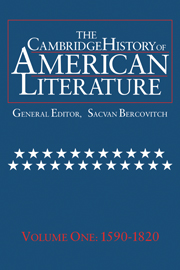Book contents
- Frontmatter
- Introduction
- THE LITERATURE OF COLONIZATION
- NEW ENGLAND PURITAN LITERATURE
- BRITISH-AMERICAN BELLES LETTRES
- THE AMERICAN ENLIGHTENMENT, 1750–1820
- 1 Finding the Revolution
- 2 What is Enlightenment? Some American Answers
- 3 Religious Voices
- 4 Writing the Revolution
- 5 The Literature of Public Documents
- 6 The Limits of Enlightenment
- THE LITERATURE OF THE REVOLUTIONARY AND EARLY NATIONAL PERIODS
- Chronology
- Bibliography
- Index
3 - Religious Voices
from THE AMERICAN ENLIGHTENMENT, 1750–1820
Published online by Cambridge University Press: 28 March 2008
- Frontmatter
- Introduction
- THE LITERATURE OF COLONIZATION
- NEW ENGLAND PURITAN LITERATURE
- BRITISH-AMERICAN BELLES LETTRES
- THE AMERICAN ENLIGHTENMENT, 1750–1820
- 1 Finding the Revolution
- 2 What is Enlightenment? Some American Answers
- 3 Religious Voices
- 4 Writing the Revolution
- 5 The Literature of Public Documents
- 6 The Limits of Enlightenment
- THE LITERATURE OF THE REVOLUTIONARY AND EARLY NATIONAL PERIODS
- Chronology
- Bibliography
- Index
Summary
Religious voices speak first in the Revolution. At one level, this primacy merely restates the dominance of religious expression in early American culture. Until 1765, religious publications in the colonies outnumber all other intellectual writings combined, and they remain the single largest category of publication throughout the revolutionary era. But initial dominance only begins to explain the importance of religious expression in Anglo–American political debate. The relation between dissenting religious traditions and the growth of oppositional political discourse is a barometer of cultural modification and literary creativity throughout the era.
Steeped in the English revolutions of the seventeenth century, radical Protestants in eighteenth-century America know how to oppose a king. Jonathan Mayhew's approval of “the Resistance made to King Charles I” in A Discourse Concerning Unlimited Submission (1750) is shocking to his contemporaries not because it “takes the side of Liberty, the BIBLE, and Common Sense, in opposition to Tyranny, PRIESTCRAFT, and Nonsense” – standard dichotomies in eighteenth-century Protestant thought – but because, in rejecting ‘the slavish doctrine of passive obedience and nonresistance,’ it also advocates the right to judge and then act against a king as part of “the natural and legal rights of the people against the unnatural and illegal encroachments of arbitrary power.’
Similar language could be heard in England, but it dominates debate in America in a different way altogether. Mayhew, after all, first preaches Discourse Concerning Unlimited Submission before his own congregation in the prestigious West Church of Boston. He and other American clergymen can take greater risks than their English counterparts when accused of “preaching politics instead of CHRIST” because they face a large and uniquely sympathetic audience for radical Protestant polemics.
- Type
- Chapter
- Information
- The Cambridge History of American Literature , pp. 390 - 425Publisher: Cambridge University PressPrint publication year: 1994



